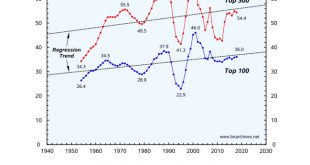from Peter Radford It’s been a month. It seems a great deal longer. Trump has slunk off the stage and the first signs of what the post-Trump political arena might look like are emerging. It isn’t hopeful. Not if you’re looking for peaceful politics. As we become more able to adjust our focus and ask “what just happened?” with a better degree of clarity, it becomes more obvious, to me at least, that the entire movement that has come to be known as Trumpism was not actually Trump’s at...
Read More »Corona as opportunity for a restart
from Norbert Häring Merkel, Macron, von der Leyen and other international leaders have described the Corona crisis as an opportunity to reorder world politics on the basis of multilateralism. The timing, shortly after the World Economic Forum’s meeting, and the echoes of the Great Reset proclaimed by the forum, are probably no coincidence, as an analysis of key passages will show. In a joint plea printed in a number of important international newspapers, António Guterres, Ursula von der...
Read More »The future of macroeconomics
from Lars Syll But why are DSGE models still in the mix at all, and in a key position? Given all the criticisms, what can such models tell us, even as a ‘first pass at important questions’? Multiple equilibria do allow for discussion of a wider range of scenarios, but any discussion of a particular scenario is still constrained by the requirements of general equilibrium theory. These requirements are at the root of the more fundamental critiques of DSGE. While Vines and Wills set out an...
Read More »Should people who want to save the world from the pandemic be demanding we pay China to produce billions of vaccine doses?
from Dean Baker I have written repeatedly on how we should have been looking for a collective solution to the pandemic, where countries open-source their research and allow anyone with manufacturing capacity to produce any treatment, test, or vaccine. (We pay upfront, like with Moderna, for those wondering why anyone would do the work.) Anyhow, we obviously did not go that route under Donald Trump. Along with many others, I have argued that we should still go this route, sharing all our...
Read More »Dominant capital is much more powerful than you think
from Shimshon Bichler and Jonathan Nitzan Capital as power, differential accumulation and dominant capital According to the theory of capital as power (CasP), capitalists and corporations are driven not to maximize profit, but to ‘beat the average’. Their yardstick is not an unmeasurable theoretical abstraction, but the readily observable performance of others. Their aim is not to increase their ‘material gain’, counted in fictitious utils or socially necessary abstract labour time, but...
Read More »Teaching heterodox microeconomics
from Lars Syll Clearly, neoclassical economists believe that neoclassical microeconomic theory is theoretically coherent and provides the best explanation of economic activity; therefore there is no good reason to not teach it, if not exclusively. Many heterodox economists also broadly agree with this position, although not with all the particulars. However, sufficient evidence exists showing that as a whole neoclassical microeconomic theory is theoretically incoherent and without...
Read More »Epistemic revolution? The search for algorithmic justice
from Peter Radford This is a long speculation, for which I apologize, provoked by the following: “In an information civilization, societies are defined by questions of knowledge — how it is distributed, the authority that governs its distribution and the power that protects that authority. Who knows? Who decides who knows? Who decides who decides who knows? Surveillance capitalists now hold the answers to each question, though we never elected them to govern. This is the essence of the...
Read More »Dealing with a pandemic as if human lives mattered
from Dean Baker It’s fair to say that the U.S. performance in dealing with the pandemic has been disastrous. With the effort led by Donald Trump, this is not surprising. His main, if not only, concern was keeping up appearances. Preventing the spread of the pandemic, and needless death, was obviously not part of his agenda. Unfortunately, many other wealthy countries, like France, Belgium, and Sweden, have not done much better. They don’t have the excuse of having a saboteur in charge who...
Read More »Critique of Rajan on debt
from Asad Zaman “my views are based on insights acquired from MMT, but . . . . . . . . . . . . ” In this post, I will provide a critique of Raguram Rajan’s article “How Much Debt is Too Much?”. (Alternative link to Rajan’s article) The article opens with a description of the governments “opening their coffers, to support small households and firms” in the COVID era. Required spending has been on the order of 15-20% of the GDP, and the article examines the extent to which...
Read More »Dean Baker of the Center for Economic Policy and Research
Rick and Dean discuss the recent market uncertainty and how the GameStop revolution is likely to play out.
Read More » Real-World Economics Review
Real-World Economics Review



